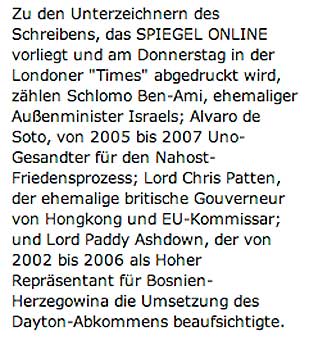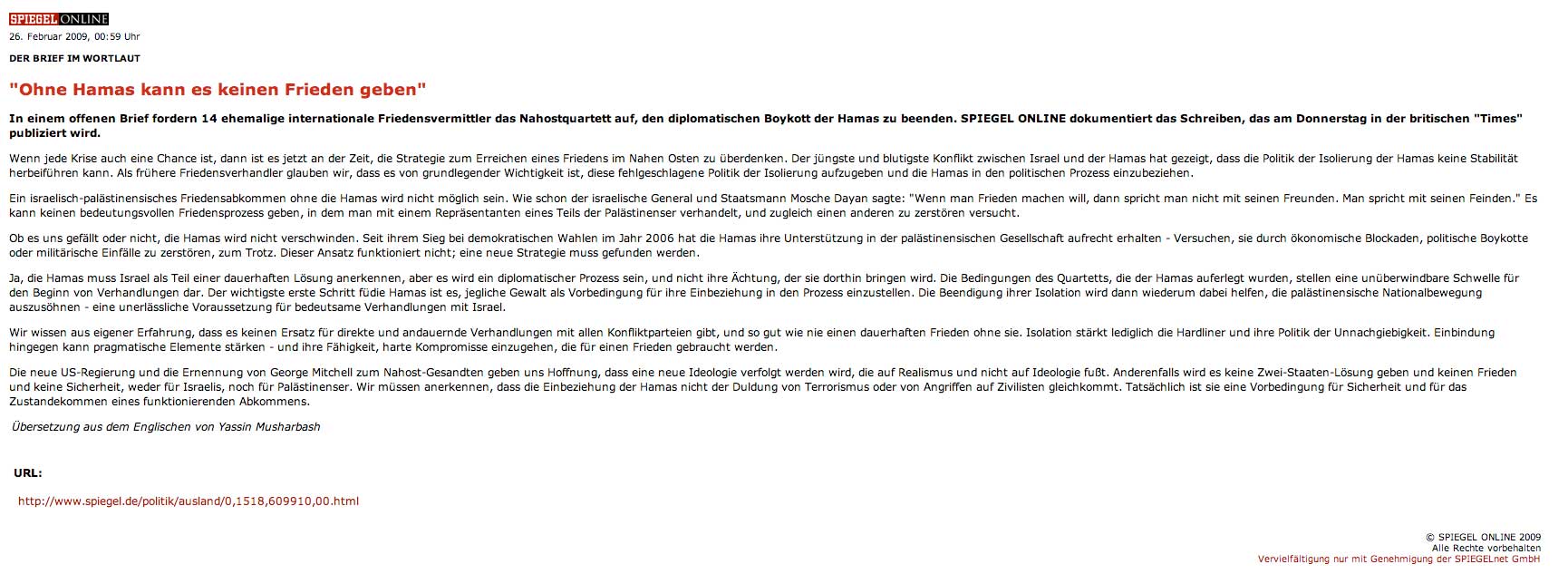There can be no peace without Hamas
If every crisis is also an opportunity, it is now time to rethink the strategy for achieving peace in the Middle East. The latest and bloodiest conflict between Israel and Hamas has demonstrated that the policy of isolating Hamas cannot bring about stability. As former peace negotiators, we believe it is of vital importance to abandon the failed policy of isolation and to involve Hamas in the political process.
An Israeli–Palestinian peace settlement without Hamas will not be possible. As the Israeli general and statesman Moshe Dayan said, “If you want to make peace, you don't talk to your friends. You talk to your enemies.” There can be no meaningful peace process that involves negotiating with the representative of one part of the Palestinians while simultaneously trying to destroy the other.
Whether we like it or not, Hamas will not go away. Since its victory in democratic elections in 2006, Hamas has sustained its support in Palestinian society despite attempts to destroy it through economic blockades, political boycotts and military incursions. This approach is not working; a new strategy must be found.
Yes, Hamas must recognise Israel as part of a permanent solution, but it is a diplomatic process and not ostracisation that will lead them there. The Quartet conditions imposed on Hamas set an unworkable threshold from which to commence negotiations. The most important first step is for Hamas to halt all violence as a precondition for their inclusion in the process. Ending their isolation will in turn help in reconciling the Palestinian national movement, a vital condition for meaningful negotiations with Israel.
We have learnt first-hand that there is no substitute for direct and sustained negotiations with all parties to a conflict, and rarely if ever a durable peace without them. Isolation only bolsters hardliners and their policies of intransigence. Engagement can strengthen pragmatic elements and their ability to strike the hard compromises needed for peace.
The new US administration and the appointment of George Mitchell as the Mideast Envoy give hope that a new strategy grounded in realism and not ideology will be pursued. Without this, there will be no two-state solution and no peace and security for either Israelis or Palestinians. We must recognise that engaging Hamas does not amount to condoning terrorism or attacks on civilians. In fact, it is a precondition for security and for brokering a workable agreement.
Michael Ancram. Former Parliamentary Secretary of State at the Northern Ireland Office (1994 – 1996), he was responsible for the negotiations leading to the Northern Ireland Peace Process, and was the first British minister to meet with Sinn Fein and the IRA for 25 years.
Lord Paddy Ashdown. Former High Representative for Bosnia and Herzegovina (2002-2006) overseeing implementation of the Dayton Peace Agreement.
Dr. Shlomo Ben-Ami. Former Israeli Foreign Minister (2000 - 2001), he was a key negotiator with the Palestinians at the 2000 Camp David peace summit. He also led the Israeli delegation to the Taba peace negotiations. He is currently Vice-President of the Toledo International Centre for Peace.
Betty Bigombe. As former Minister in the Uganda government, she initiated peace talks between the Uganda and the Lord's Resistant Army (LRA) and provided technical support during the Sudan and Uganda peace negotiations (1998 – 2000). Later in 2004-2005 she was the chief mediator between Uganda and the LRA.
Álvaro de Soto. UN Special Coordinator for the Middle East Peace Process and Envoy to the Quartet (2005-2007). Earlier, he led the Cyprus peace and reunification negotiations (1999-2004) and the negotiations that ended the decade-long war in El Salvador (1990-1991).
Gareth Evans. As former Australian Foreign Minister (1988 - 1996) he assisted in development of the UN Peace Plan for Cambodia. Currently he is the President of the International Crisis Group.
Peter Gastrow. As a former member of Parliament in South Africa, he participated in the negotiation of the National Peace Accord (1991) and played a key role in implementing it. He was then a member of the National Peace Committee and the National Peace Secretariat, the bodies charged with implementing the Accord (1991-1994).
Gerry Kelly. As member of Sinn Fein he played leading role in negotiating the Good Friday Agreement in Northern Ireland (1998). He is a current member of the Northern Ireland Assembly.
John Hume. Former leader of the Social Democratic Liberal Party of Northern Ireland (1979 - 2001), he was one of the architects of the Northern Irish peace process, for which he won the Nobel Peace Prize in 1998 as well as the Gandhi Peace Prize and the Martin Luther King Award.
Dr. Ram Manikkalingam. Senior advisor to the former President of Sri Lanka on the peace process with the Liberation Tigers of Tamil Eelam. He is the founder of the Dialogue Advisory Group and visiting professor at the University of Amsterdam.
Lord Chris Patten. Former British Governor of Hong Kong (1992-1997) and EU Commissioner for External Relations (2000-2004). He also chaired the Patten Commission established as part of the Northern Ireland Peace Process in 1998.
Sir Kieran Prendergast. As UN Under Secretary-General for Political Affairs (1997-2005) he oversaw the Cyprus peace and reunification negotiations. He has also been involved in peace processes in the Middle East, Afghanistan, DRC, Guatemala, Somalia, Burundi and East Timor.
Yezid Sayigh. Former advisor and negotiator in the Palestinian delegation to the peace talks with Israel, 1990-1994, and since 1999 has provided policy and technical consultancy on the permanent status peace talks. Currently he is professor of Middle Eastern Studies at the Department of War Studies, Kings College.
Thorvald Stoltenberg. Former Norwegian Minister of Defence and Foreign Affairs (1987 – 1989 and 1990 – 1993) and Special Representative of the UN Secretary-General, he acted as peace negotiator in former Yugoslavia (1993 – 1996


